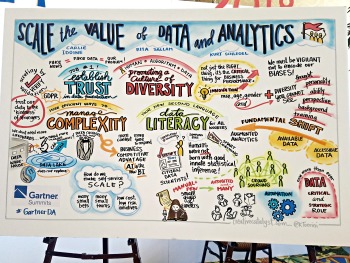Earlier this month, I attended the Gartner Data & Analytics Summit in Grapevine, Texas, along with 3,000+ data thought leaders, analysts, practitioners and citizens. It was an action-packed four days with more than 100 sessions focused on the theme of how to scale the value of data and analytics.
As a career marketer and first-time attendee, I was excited to learn insights and strategies for how to help our clients, and our own information management business, better leverage data and analytics to meet the growing demand for digital and data-driven transformation.
If you’ve never been to this conference, I highly recommend it. The scale, execution and caliber of the valuable insights and network of attendees/solution providers that were available is hard to match. And for this Illinoisan, the opportunity to escape snow and frigid temps was an added bonus!
For those unable to attend this year, I thought it would be helpful to share some of my key takeaways and a few themes that resonated throughout the Summit.
Trust is Paramount
During a keynote, Gartner shared one of its predictions regarding the prevalence of fake news: “By 2022, the majority of individuals in mature economies will consume more false information than true information.”
Since fake news essentially equals fake data, establishing trust in the data foundation is critical and a worthwhile undertaking for any organization. To combat it, we need to verify and validate data to better inform all the decisions we make. Providing scrutiny through verification leads to the importance of metadata, and Gartner called for a new, transparent metadata playbook that leverages crowdsourcing and automation rather than centralized groups maintaining business glossary repositories. The idea is to learn from the application and consumerization of Wikipedia (posited as an efficient and collaborative model for how content can be created, reviewed, sourced and trusted) and apply it to our own governance practices.

First San Francisco Partners’ Director of Marketing Czarina Carden attended the 2018 Gartner Data & Analytics Summit.
Diversity (Seen and Unseen) Matters
Making diversity a core principal of a data and analytics program was also a key call to action, with regard to diversity across people, algorithms and data.
Diversity you can see in the workplace, such as across age, gender, ethnicity and culture, is positively correlated with profitability and performance. A recent McKinsey report showed that companies with the most ethnically diverse executive teams were 33 percent more likely to outperform their peers on profitability. Gartner also talked about people diversity that’s harder to see, such as varying work styles. When diversity in the workforce is combined with diversity in data sources, bias in algorithms can be reduced.
By promoting a culture of diversity in these and other areas, organizations can enable their teams to work in the most productive ways and leverage innovations that aid business performance (and transformation).
Data Literacy is a Measurable Divide We Can Cross
According to Gartner, becoming data literate is the new must-have skill for the digital revolution, yet data literacy is still staggeringly inconsistent across many businesses today. They predict that “by 2020, 80% of organizations will initiate deliberate competency development in the field of data literacy, acknowledging their extreme deficiency.”
The main calls to action Gartner shared is to create a common language and culture around data, while also providing training in context, creating a certification system (e.g., requiring a driver’s license to access data) and leveraging augmented analytics to impact the data discovery process and grow the number of citizen data scientists in your organization.

Awesome illustration highlighting the top challenges to scaling the value of data and analytics from the Opening Day keynote by @KTorrini.
Data Catalogs are the New Black
As organizations struggle to organize, inventory and classify distributed data assets that are growing in both volume and complexity, it’s no surprise the demand for data catalog tools has soared.
Managing the increasing complexity and diversity of data is both a barrier and an opportunity, one that Gartner says inherently involves metadata and more precise data and analytics programs enriched with more context, more understanding and more timely responsiveness.
Data catalogs are a critical capability; Gartner predicts that “by 2020, organizations that offer users access to a curated catalog of internal and external data will realize twice the business value from analytics than those that do not.”
Augmented Analytics is the Future
Augmented analytics, which Gartner describes as an approach to automate insights by applying machine learning and natural-language generation, will usher in the next wave of market disruption that we’ll likely see in the next two to five years.
What can you expect from this “augmented analytics age”? According to Gartner, think augmented data preparation with algorithms detecting schemas and recommending enrichment, data lineage and metadata. Or even insights for the end user that are narrated in natural language and visualizations that automatically distinguish what is important and actionable.
By 2020, Gartner predicts 50% of the analytic queries will be generated automatically, or by using search, natural-language processing and voice — and 30 percent of today’s data scientist tasks will be automated.
As Business Intelligence/Analytics continues to evolve, don’t forget that success should not be based on what analytics capability to deploy next. Ultimately, it’s about delivering the analytics capabilities required to support the right business outcomes.
After attending the inspiring keynotes, Gartner analyst-led sessions and speaking with fellow attendees and vendors, I left Grapevine with a renewed sense of urgency and community — we were all there because we truly believe data and analytics is the key to unlocking untapped business value and innovation.
Article contributed by Czarina Carden. She more than 15 years of marketing experience includes working with start-up to midsize, B2B and B2C companies, as well as currently running a small marketing firm. Czarina focus on leveraging customer-first marketing strategies and messaging to create trust, emotional connections and value-add conversations between organizations and their customers.


